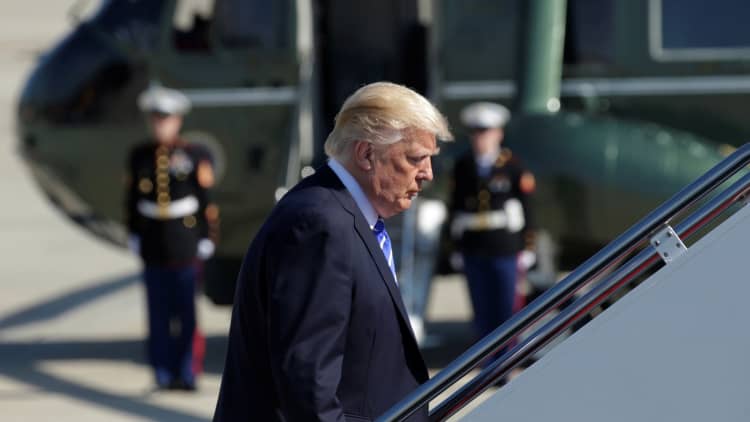
The absence of credibility costs presidents dearly. And the bill for Donald Trump's years of falsehoods is now coming due.
Just four months into his presidency, Trump faces a mortal threat to his political survival. Contemporaneous memos kept by James Comey, the FBI director he fired last week, indicate Trump in February requested that he end an investigation into ex-national security advisor Michael Flynn.
If that happened, it could constitute obstruction of justice and fuel efforts to force his removal from office. The president, through a White House aide, said it didn't happen.
But few Americans believe the president's word anymore.
The man who touted "hyperbole" and "exaggeration" in his best-selling business book and seized the political spotlight with fabricated doubts about the President Barack Obama's birthplace, entered the presidency making transparently untrue statements about the size of his inauguration crowds. He holds the weakest reputation for honesty of any recent president.
Last month's NBC News/Wall Street Journal poll makes that clear. Only 25 percent of Americans rate Trump highly for being "honest and trustworthy."
Twice that many — 53 percent — give him low marks for honesty. That reflects condemnation of his truthfulness by virtually all Democrats and a solid majority of independents. Only a bare majority of Republicans — 53 percent — praise his truthfulness, even though more than 8 in 10 of them voted for him last fall.

Over the last quarter-century, Trump's predecessors have all been able to tap larger reservoirs of public faith. In the spring of Obama's first year in office, the NBC/WSJ poll showed that Americans praised Obama's truthfulness by a 3-1 margin. Some 90 percent of Democrats, 57 percent of independents and even 37 percent of Republicans rated his honesty highly.
President George W. Bush held comparable standing at the outset of his term in 2001. Only President Bill Clinton — whose numerous crises of credibility led critics to dub him "Slick Willie" — was near Trump territory. Yet even Clinton began his term with a net positive assessment, 34 percent to 30 percent, of his commitment to "keep his word."
The credibility hole Trump is stuck in bears directly on how Americans and, of more immediate consequence, congressional Republicans, process the news of the past 10 days. The president fired Comey amid an FBI investigation of his campaign and Russian interference in the 2016 election, and then acknowledged publicly the investigation was part of the reason. Now he faces Comey's word that he tried to stop the investigation of Flynn.
House Speaker Paul Ryan expressed confidence in the president on Wednesday morning and stressed that the role of Congress right now is to "gather facts."
But the danger for Trump is that these cascading developments collapse his support among congressional leaders, which has softened due to nonstop controversy since Inauguration Day. One sign was the assessment Wednesday morning
"While I am no Comey fan, I won't defend anyone who obstructs justice," Cole told CNBC. "I believe it is time for Comey to appear before Congress, answer questions under oath, and turn over all relevant documents to Congress and the Justice Department."
Cole did not say he believes Trump.


